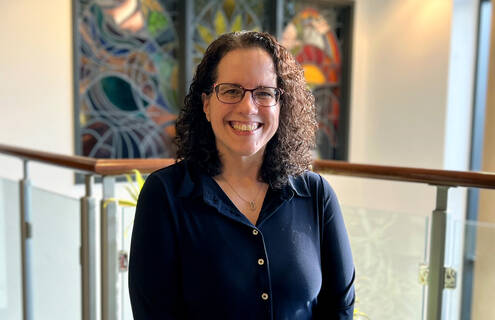
This experience has shown me that it’s never too late to get serious about taking care of yourself and do what is best for your health.
Holly Kennedy, diabetes patient at Cheshire Medical CenterHolly Kennedy has lived with multiple sclerosis (MS) and its complications for more than 30 years.
Last year, she began experiencing new symptoms like extreme fatigue and blurry vision. Because of her MS, Kennedy, 51, said she didn’t think much of it at first.
“The symptoms seemed to be getting worse and more consistent and I thought it was just my MS progressing,” she said.
But during Kennedy’s annual primary care visit at Cheshire Medical Center in June 2024, it was determined her new symptoms were not related to her MS. She had Type 2 diabetes.
Kennedy had been told she was prediabetic a few years prior, but “didn’t worry too much about it.”
“I regretted that I didn’t take the diagnosis of pre-diabetes as seriously as I should have and allowed the busyness and stress of life to give me an excuse to not put my health first,” she said.
Diabetes is a chronic health condition that affects how the body turns food into energy. When food is consumed, the body breaks it down into sugar and releases it into the bloodstream. If someone has insulin problems, their body’s cells can’t use sugar for energy properly, resulting in spikes in blood sugar and other health issues.
People with Type 1 diabetes don’t produce insulin, while people with Type 2 diabetes don’t respond to insulin well or don’t make enough of it. There is no cure for diabetes, but with the help of healthcare professionals, most people can manage their diabetes with medication, diet and exercise.
Once diagnosed with Type 2 diabetes, Kennedy said she began to educate herself—with the help of her healthcare providers—on how to manage the disease and improve her lifestyle.
“This experience has shown me that it’s never too late to get serious about taking care of yourself and do what is best for your health,” she said.
Kennedy has routine follow-up appointments to help manage the disease with her diabetes care team at Cheshire, consisting of Andrew Tremblay, MD, Currier Carter, MSN, APRN, and Ashley Medhurst, RD.
“It’s important for people to understand that the whole point of routine check-ins with your providers is to be able to catch these types of medical issues that can become chronic before they become a problem,” Tremblay said. “We look at our role in primary care as one that serves to help our patients achieve their health goals, both in the present and into the future.”
Because of the care she received, Kennedy recently honored all three providers through Cheshire’s Circle of Gratitude program, which allows patients and their families to share their appreciation for the hospital’s staff.
“My providers at Cheshire Medical have been instrumental in my success in managing diabetes,” Kennedy said. “They are not only extremely knowledgeable, but are caring partners in this journey with me who genuinely want to help me be … as healthy as possible.”
For more information on diabetes care at Cheshire Medical Center, click here.